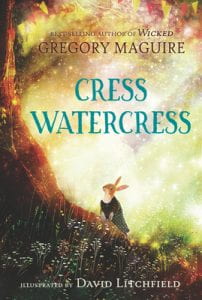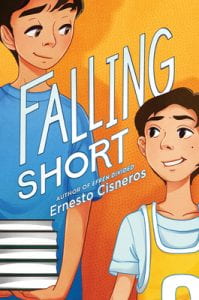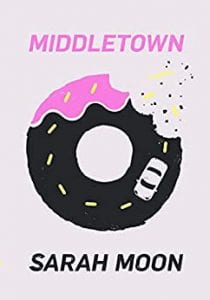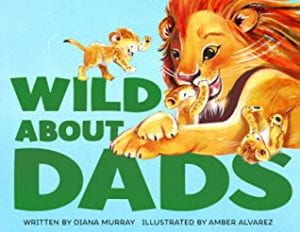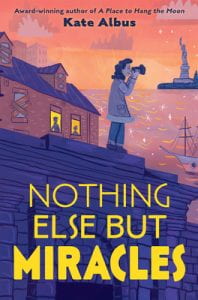 Albus, Kate. Nothing Else but Miracles. Margaret Ferguson Books, Holiday House, 2023. 978-0-823-45163-0 $17.99. 278 p. Grades 4-7.
Albus, Kate. Nothing Else but Miracles. Margaret Ferguson Books, Holiday House, 2023. 978-0-823-45163-0 $17.99. 278 p. Grades 4-7.
The Bryne children–seventeen-year-old Fish, eleven-year-old Dory, and six-year-old Pike–are on their own in the middle of World War II after their dad enlists. Their mother died a few years prior, but Pop is sure the tight knit Lower East Side neighborhood will take care of his children while he’s away. And they do. The ethnically diverse neighbors lavish food and care on the small family. No one anticipates, though, the entrance of a mean-spirited landlord after the sudden death of the kindly one. Dory, the protagonist, is a magnet for trouble, and does little to avoid getting in scrapes. When the new landlord presses to see their elusive father and threatens foster care, Dory takes it upon herself to find a solution. Caputo’s, their friend’s Italian restaurant, houses an ancient dumb waiter that acts like an elevator. Dory sneaks in and risks all to try out the unused equipment only to find that the ascending floors reveal an abandoned hotel. Once school is out for the summer, the family takes up residence there, avoiding detection from both social services and the restaurant staff. Until D-Day. Pop’s letters–and the rent checks–stop coming. Fish takes a job to help the money situation, but as more of the neighborhood’s fathers’ and sons’ blue service stars get replaced by gold, the children’s fear that Pop may not be coming back grows more real. This historical fiction book gives a vivid picture of a working class New York City neighborhood in the 40’s. Author Albus creates a memorable character with spunky Dory and does not stint on mystery or historical background. All characters seem to be white.
THOUGHTS: Though not a deep read about life during World War II, Nothing Else But Miracles drops a lot of names, places, and objects connected to the time. Give this book to readers interested in World War II stateside. Similar to Island Spies by Sheila Turnage, this book has some suspense, but the former has higher stakes for the country (spies vs. foster care, Pop’s return). Pair with the poignant The War That Saved My Life, Kimberly Brubaker Bradley’s book with its exquisite narrative and soulful characterization. Albus’s book is so much lighter, even with the loss of life. The reader never gets the same feeling here as one gets when Ava (in Bradley’s book) describes sleeping on sheets for the first time. A footnote: at one point, the family wants to go to the observation deck of the Empire State Building and needs $3.00, a small fortune at that time. I researched this and found that the Empire State Building did charge $1.00 admission. However, as a twelve-year-old New Yorker in the sixties, I recall walking into the lobby of the Empire State Building one evening and just taking the elevator up for free. My siblings confirm this.
Historical Fiction

